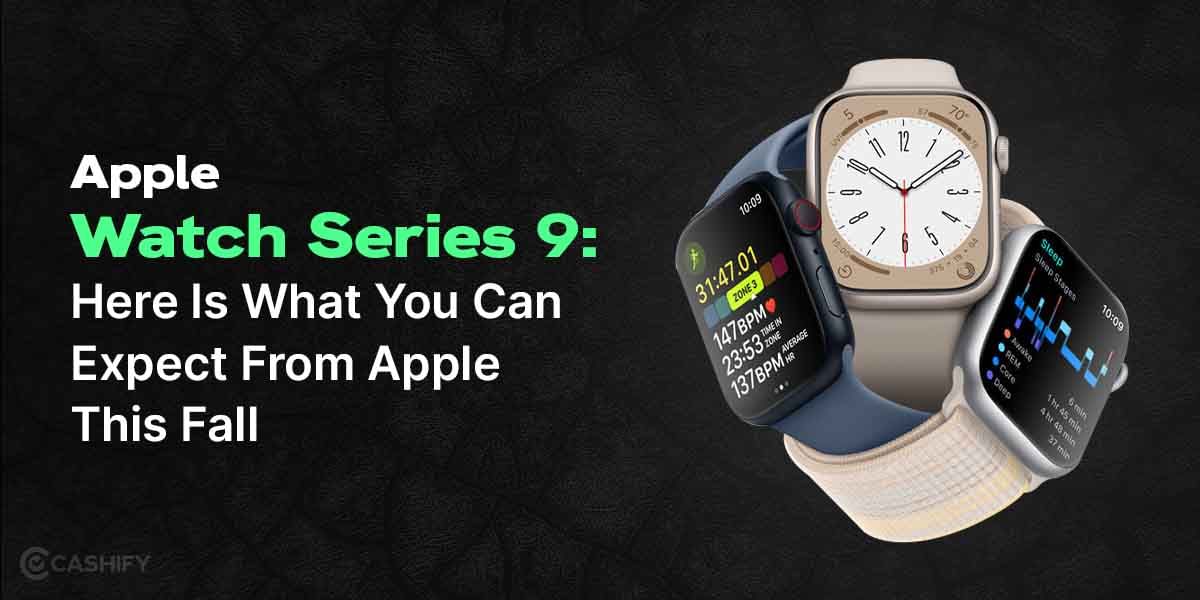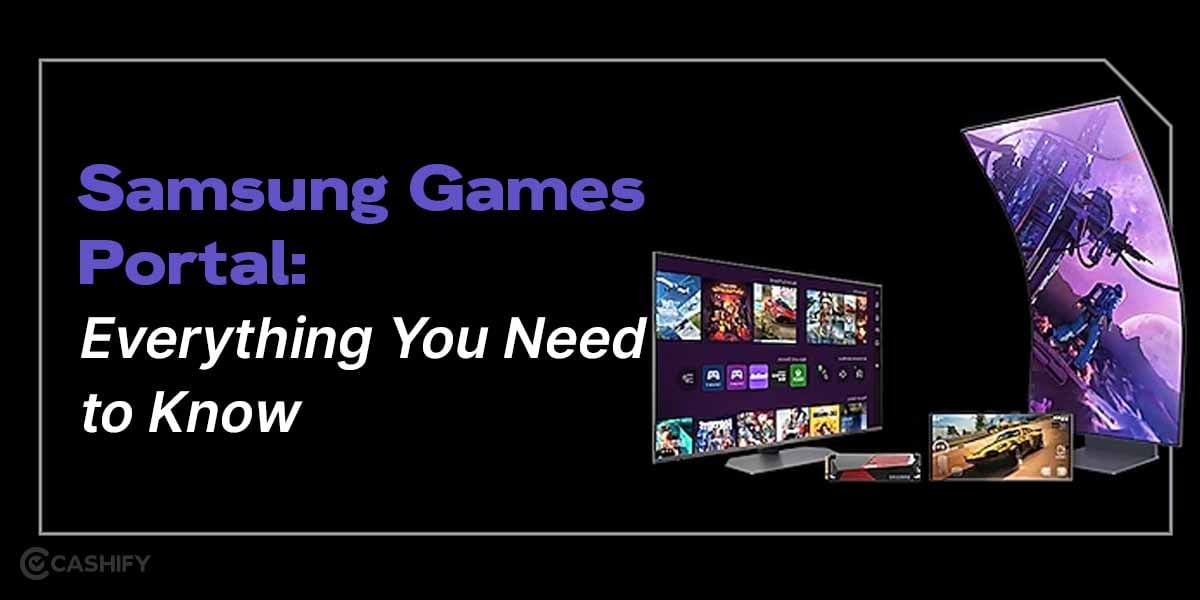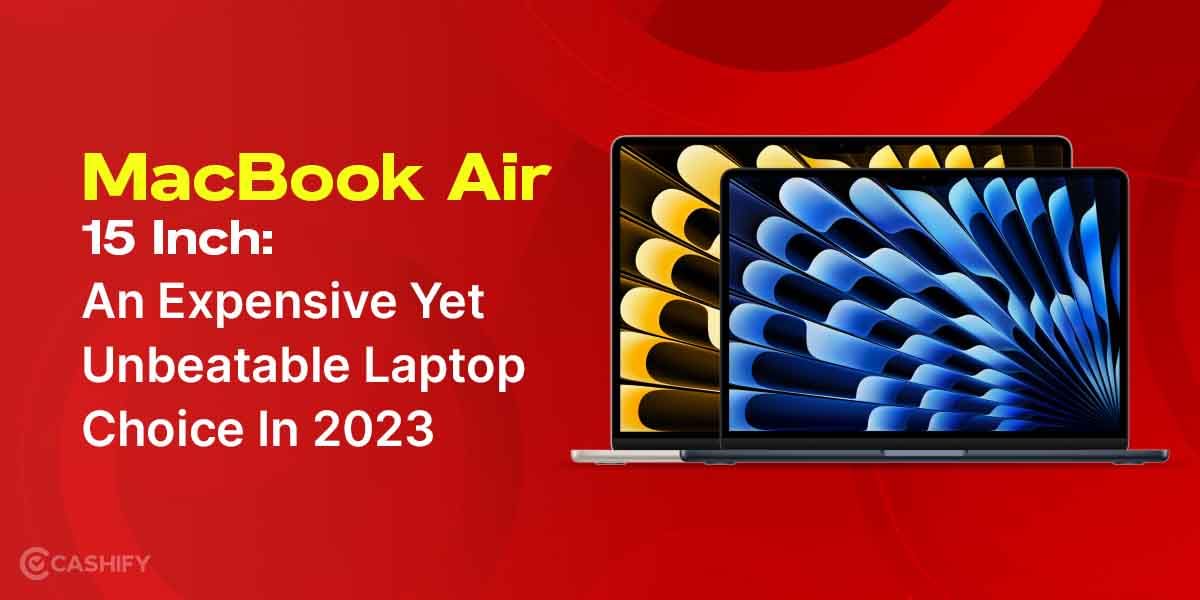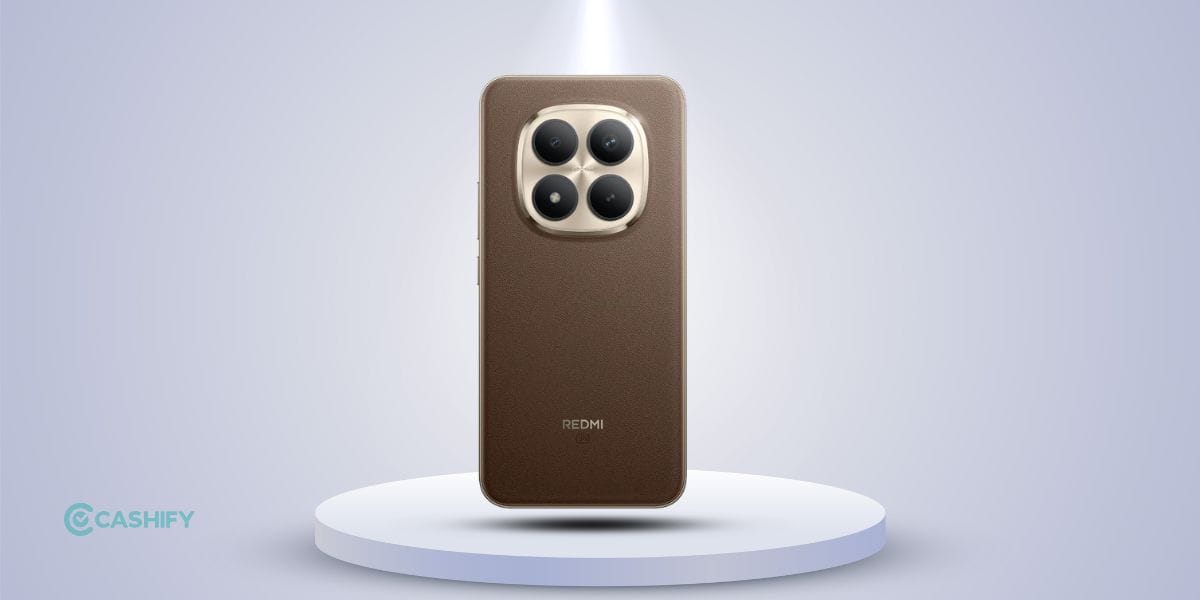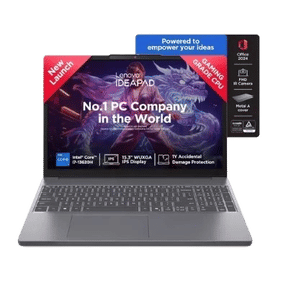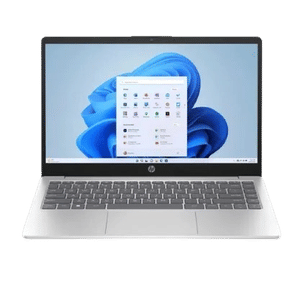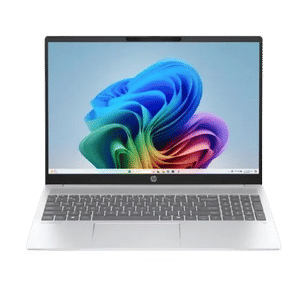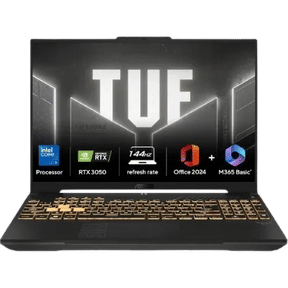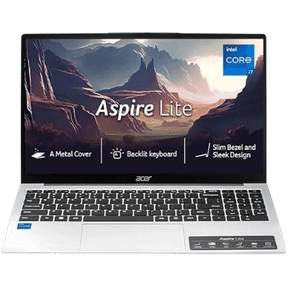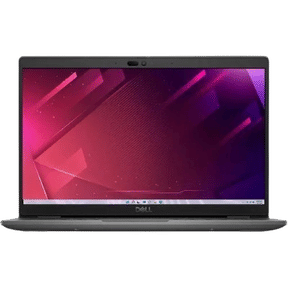Hard Disc Drives (HDDs) are among the most commonly used types of computer storage. People used them for a very long period as a medium to store files, media, documents, and other kinds of data. But did you realize that the efficiency of your hard drive impacts the efficiency of your entire system?
You see, your hard drive loses efficiency every time you write to or read from it. And over a period of time, it’s time to optimize your hard disk if you’ve noticed recent latency when accessing files, starting games, or running programs.
You may feel that your windows system is slowing down but it could be because of a cluttered HDD. This article will list down some of the tips on how to improve hard drive performance and efficiency so that you can get a faster machine.
Also Read: HDD vs SSD: Which One Should You Choose?
Tips To Improve Hard Drive Performance
1. Delete Temporary Files
Every time you use an internet browser or other apps on your Windows machine, some temporary files are downloaded on your system to speed up the process. For example, Google Chrome downloads some data in form of cache from each website you visit, this speeds up the process if/when you visit the website next time.
This temp data can take up a significant amount of space on your hard drive if you don’t delete them. The same is true for duplicate files on your system, which should be deleted because they can fill up needless space.
To remove temporary files from your windows system:
1. To launch File Explorer, Open the Run Menu by pressing “Windows + R“, and in the Run menu type” %temp%” and press enter.
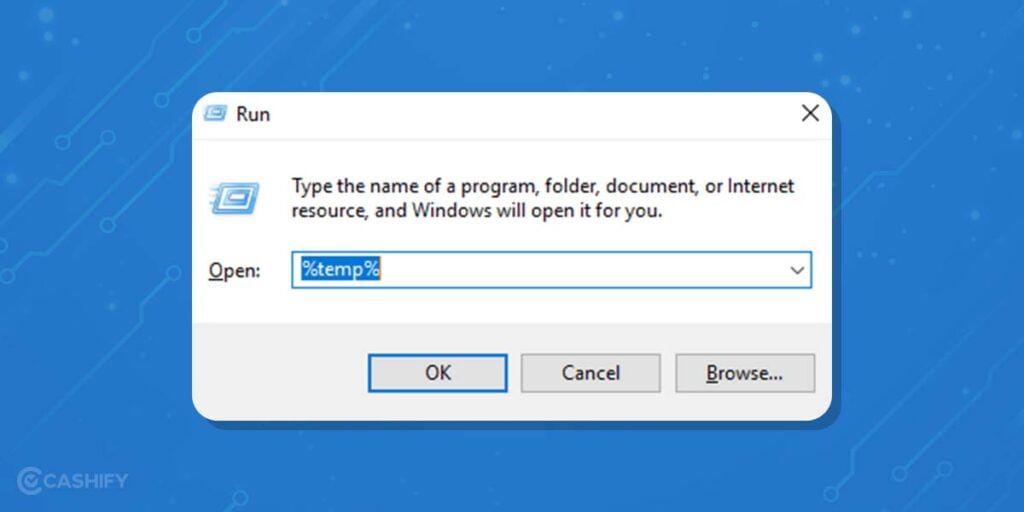
2. Now press “CTRL + A” keys to select all temporary files in the Temp folder.
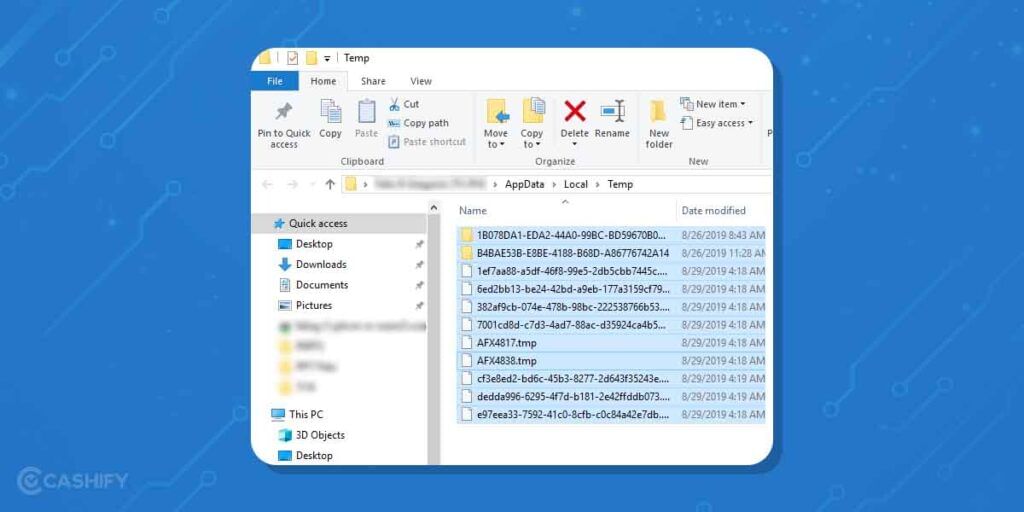
3. Now click on “DEL” key on your keyboard or Right Click and select “Delete“. This will delete all temp files from your windows system. You can even go ahead and clear these deleted files from the recycle bin as well. And deleting these temp files should be done every week to improve hard drive performance.
2. Defragmentation Of HDD
The data that the computer saves on a hard drive are serially stored on adjacent sectors, and when you erase them, they are designated as replaceable. Hence, the drive replaces these sectors with new data when users want to store new data there.
When large files need to be stored yet there aren’t enough replacement sectors, it creates a problem. When this occurs, the OS stores data in a different sector of the disc, causing a single file to be dispersed over the drive.
Hence, when the System wants to run the specified file, it must gather data from all around the hard drive, which might be a laborious job.
Defragmentation organizes all of this material to make it easier for the hard disc to retrieve it. Defragmentation, in essence, reorganizes files dispersed throughout the HDD.
To do optimization or defragmentation, you can follow the below simple steps.
1. Search for “Disk Optimisation” or “defrag” in the search bar of your windows.
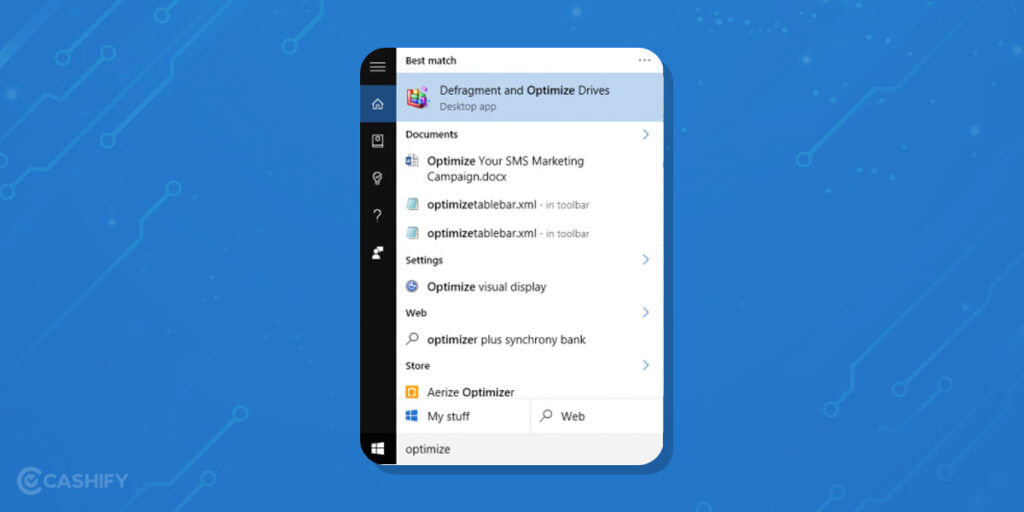
Or Right click on any drive that you would like to Defragment and click on Properties > Tools > Optimize.
2. Now select the disk you want to optimize and click on “Analyze”
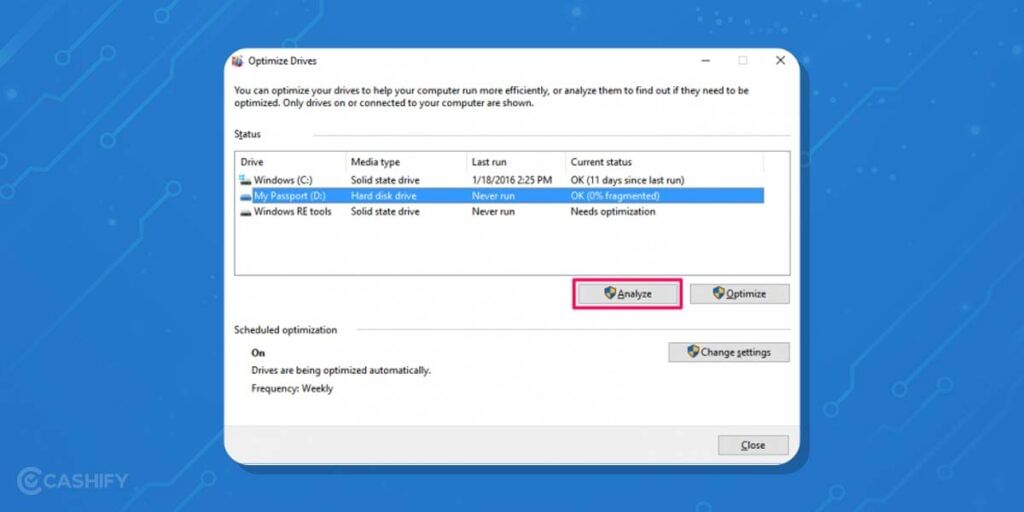
3. Now check the fragmented percentage in the results and make sure the fragmentation is under 5%.
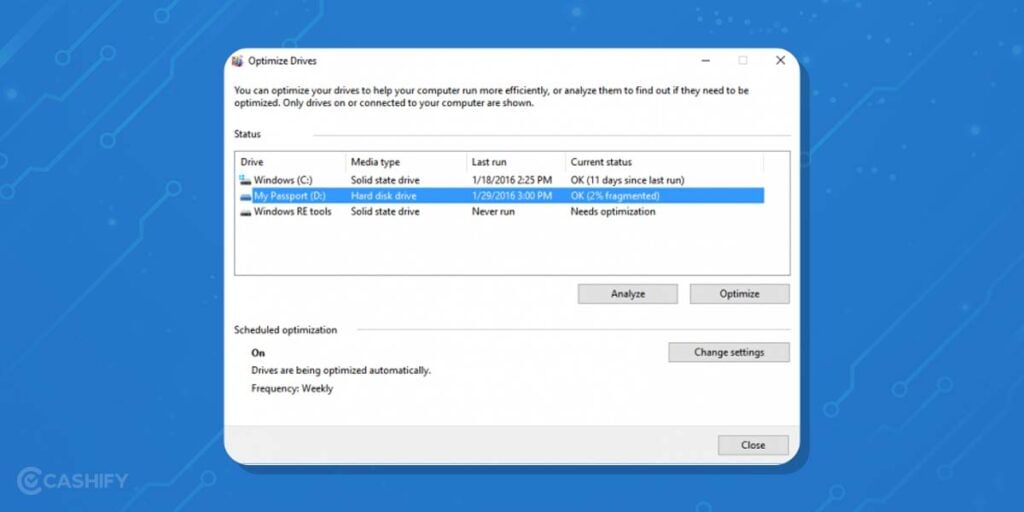
4. If you want to defragment your disk click on “Optimize“
Disk defragmentation is only possible with Hard Disc Drives or HDDs. However, SSD makes use of a feature called TRIM that purges unnecessary data to make room for fresh data. Data recovery is not possible while using TRIM because it entirely deletes blocks of data, which is a drawback.
Also read: What is the Difference Between External Storage and Internal Storage?
3. Enable Write Caching
The feature called “write caching” enables you to keep data in a cache before writing it to the hard drive. Because the cache is quicker and can write information much more quickly than the hard disc itself, and helps improve the overall load time.
There is a drawback to this measure, though. The information in this temporary cache could be lost if the machine shuts down abruptly. Using these steps will let you turn on write caching.
1. Press the Start button. Type Device Management into the Windows search box.
2. In the Device Manager’s Disk Drives menu, choose your hard disc under Disk Drivers. Choose Properties from the context menu when you right-click on the hard disc.
3. Choose the Policies tab from the Properties menu.
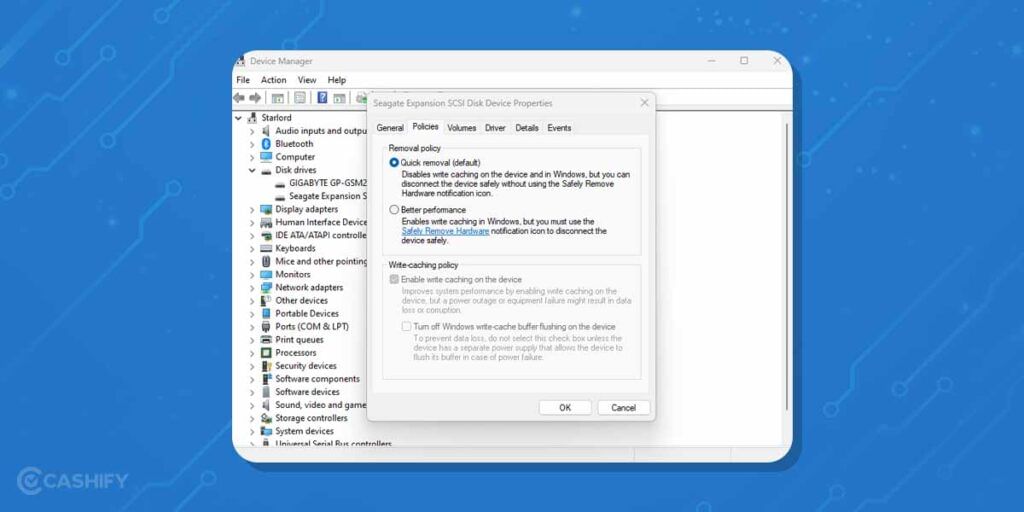
4. Choose the checkbox to enable write caching on the device and hit OK.
4. Optimize Background Services, Apps, and Storage Space
That is general advice that boosts the efficiency of the computer as well as the HDD. You may not be able to operate as intended if you have too many background services and programmes running. This is because they will consume more memory and hard drive space. Also, if your storage space is getting limited, it could have an effect since the hard drive will struggle to rearrange files to make room for the files to be preserved.
The rule of thumb is that you should get rid of anything that is superfluous and a resource drain. To boost Windows 11/10’s overall performance, though, all you need to do is switch to a hybrid model.
Install Windows on an SSD while keeping your HDD for everything else. You can select to manage HDD optimization while leaving SSD management to Windows.
Also Read: Best Gaming Laptops Under 1 Lakh In India
5. Scan Your Hard Drive For Bad Sectors
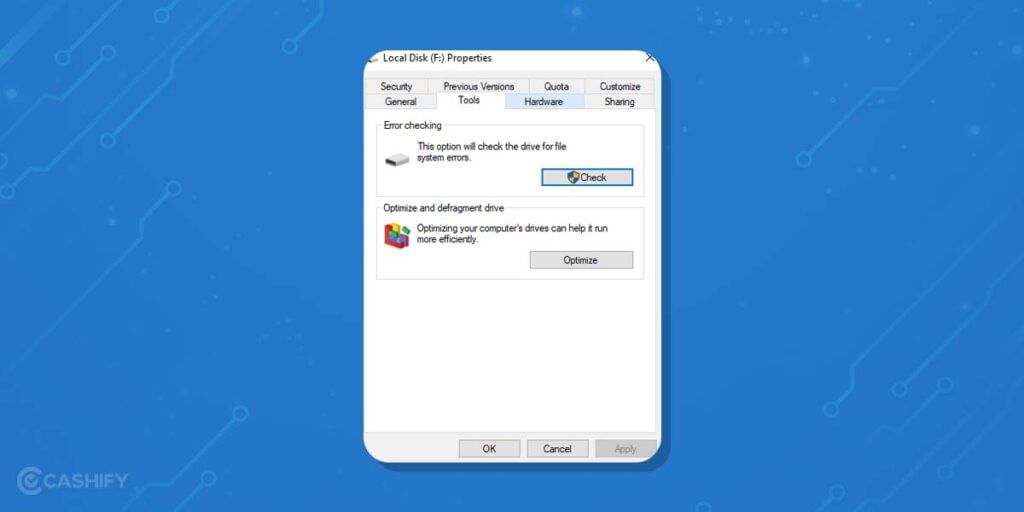
Your hard drive’s faulty sectors are undesirable for a number of reasons. Bad sectors can corrupt some or all of your valuable data, which is one of the key reasons why they are terrible. Also, when your hard discs have faulty sectors, read and write requests are ignored. This implies that data stored in such sectors is not viable. Here’s how Windows may assist you if your hard drive has faulty sectors:
1. Select the hard drive, right-click to view “Properties“
2. Choose the Tools tab and select “Check“
3. Also, select the options for “Search for” and try recovery of faulty sectors and Automatically correct file system issues.
4. Press Start.
6. Get Rid Of Junk Data
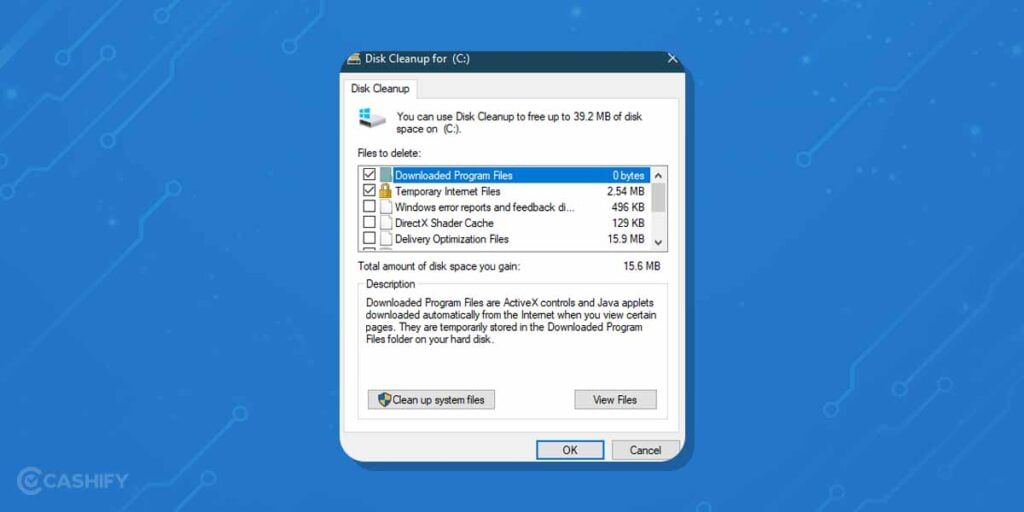
You’ve certainly heard of it a million times, yet despite how obvious it may seem, having unnecessary, worthless information on your system places a heavy weight on your hard disc. This burden thus slows down the speed of your hard disc.
Disk Cleaning, a utility offered by Windows helps you to resolve these problems, can help you clear up disc space and improve the speed and performance of your computer. To use Disk Cleanup:
1. In the Windows search box, type Disk Cleaning
2. Now from the drop-down menu select which drive you wish to clean.
3. Decide which files you want to keep and which ones you want to remove.
4. By selecting “Clean up System Files” option at the bottom, you can also delete system files.
5. The recommended options are to select Downloaded Program Files, Temporary Internet Files, Recycle Bin, Temporary Files, and Thumbnails.
5. Press OK to start the cleanup process.
7. Time for An Upgrade
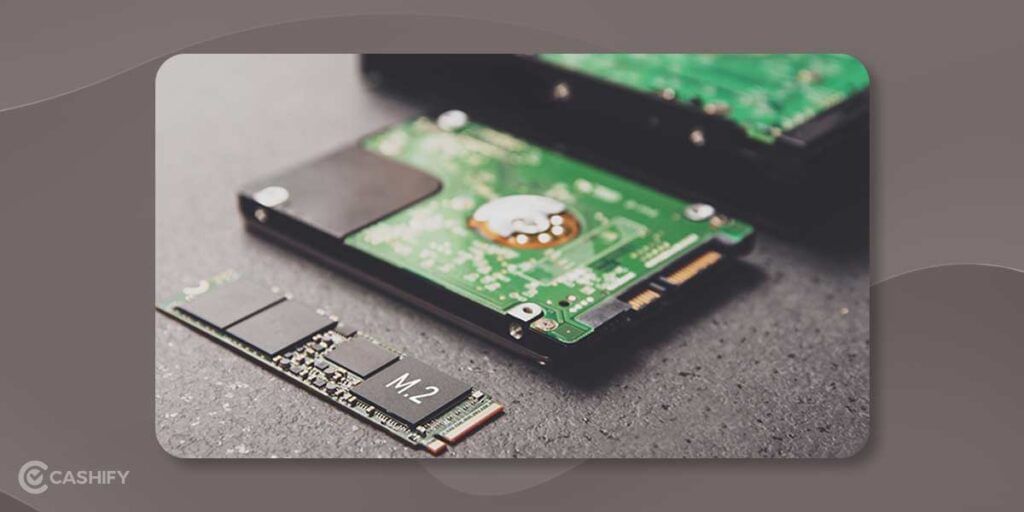
If you’ve been using a hard drive for a while, it’s possible that the issue is because of an ageing hard drive, rather than any other hard drive problems. Changing your hard disc for a new one is your best option in this situation. That being said, there is still a limit to improving hard drive performance and if your budget allows, switching to an SSD will improve your system’s performance quite a lot.
Also Read: Best SSDs To Give Your Storage A Boost
Conclusion – Improve Hard Drive Performance
In a nutshell, hard drives are an important part of computer systems. However, with time, it can slow down. However, don’t worry! You can easily resolve this issue with the tricks and tips discussed above. Hopefully, the above tips help you understand how to improve hard drive performance. These tips will help you speed up your hard drive with appropriate maintenance. So, try it and let us know your experience in the comment section below.
FAQs
Q. How Can I Fix a Slow Hard Drive?
A. You can try the tips mentioned below to fix a slow hard drive.
- Check bad sectors
- Delete temporary files
- Run disk cleanup
- Remove unnecessary applications
- Run CHKDSK commands
- Defregmentation of HDD
- Enable Write Caching
- Upgrade it
- Optimize it for storage space, apps, and background services
Q. Why is a Hard Drive Slower than an SSD?
A. Generally, SSDs don’t have physical moving parts. It reduces start-up wait times and delays when you open any app or perform heavy computing tasks.
Q. Why does the Hard Drive Get Slow?
A. There are various reasons why Hard Drive gets slow, such as too many temporary files, bad sectors, viruses, and file fragmentation.
Buying refurbished mobile phones was never this easy. Sell your old phone and get exclusive offers & discounts on refurbished mobiles. Every refurbished phone is put through 32-point quality checks to ensure like-new standards and comes with a six-month warranty and 15-day refund. Buy refurbished phone easily on no-cost EMI today!







